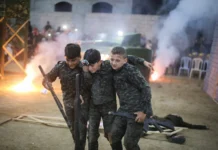“There is no fear like that of the one who sells out his people.” — Nâzım Hikmet
On March 19, the Turkish government under President Recep Tayyip Erdoğan arrested Ekrem Imamoglu, who has been mayor of Istanbul since 2019, on charges of “establishing and managing a criminal organization,” “helping a terror organization,” “taking bribes,” “extortion,” “unlawfully recording personal data” and “rigging a tender.” The Interior Ministry announced that he was also suspended from his post as mayor as a temporary measure. On March 28, even Imamoglu’s lawyer was arrested and later released on the condition that he be kept under “judicial control.”
Imamoglu, who is now being held in Istanbul’s Silivri prison, notorious for housing political prisoners, is a leading figure in the main opposition party in Turkey, the Cumhuriyet Halk Partisi (CHP), which was the party of Mustafa Kemal Atatürk, founder of the Republic of Turkey. Imamoglu has long been viewed as the likely presidential candidate in presidential elections that, by Turkish law, need to be scheduled before May 7, 2028. Another popular figure is Mansur Yavas, the mayor of Ankara. On March 24, several days after his arrest, Imamoglu won a CHP party vote and was declared the party’s presidential candidate, a decision formalized by the party on March 27.
The CHP had made significant gains in the 2019 local elections, but it was the 2024 local elections that were a major upset: For the first time in 22 years of the rule of Erdoğan’s Adalet ve Kalkınma Partisi (AKP), the CHP received more votes—37.8% of Turks voted for the CHP over 35.5% percent voting for the AKP. The CHP also won the mayorships of Ankara, Istanbul, Izmir, Bursa and Antalya—together constituting the country’s capital and five largest cities.
It is therefore not surprising that the country erupted in demonstrations following Imamoglu’s arrest, with hundreds of thousands taking to the streets in dozens of cities. Media have reported significant protests ongoing in Adana, Ankara, Antalya, Aydin, Balikesir, Adiyaman, Afyonkarahisar, Amasya, Ardahan, Artvin, Bartin, Bilecik, Bolu, Burdur, Bursa, Canakkale, Denizli, Edirne, Eskisehir, Giresun, Istanbul, Izmir, Kastamonu, Kirikkale, Kırsehir, Kutahya, Manisa, Mersin, Mugla, Sinop, Tekirdag, Usak, Yalova and Zonguldak. CHP leader Ozgur Ozel said that 2,200,000 people protested the arrest at Istanbul’s Maltepe district on March 29, though media reports put the number at hundreds of thousands. This list is not exhaustive.
Erdoğan’s government has responded as it has historically in such situations: with “rubber bullets” as reported by the media, which Turkish analysts take to mean projectiles from the FN 303 riot gun used by Turkish police; TOMA vehicles, which are the Turkish-made armored water cannons designed for riot control that became famous during their widespread deployment in crushing the 2013 Gezi Park protests; tear gas, for nearly half a million units of which Turkish police recently placed orders to refill their warehouses; 1,876 people detained and 260 arrested as of March 27, including 37 arrests for social media posts; the banning from broadcasting for 10 days of the TV channel of the leading opposition outlet Sözcü; the arrest of Turkish journalists covering the protests; the arrest of Swedish journalist Joakim Medin when he arrived at the airport on March 27 to cover the protests; the deportation of BBC Turkey journalist Mark Lowen on the grounds that he was “a threat to public order”; the banning public gatherings and protests through March 26 by the Istanbul Governor’s Office; the restriction of access to YouTube, Instagram, TikTok, Twitter and Telegram in Turkey; the restriction by March 27 of a CHP website calling for a boycott of government-aligned businesses in Turkey; and court orders to X, formerly Twitter, to close “over 700 accounts of news organizations, journalists, political figures, students and others,” with which X has said that it will not comply, though there are reports that some X accounts reporting on the protests have been shut down.
Perhaps Erdoğan would have provoked less of a reaction with such a move—which he timed carefully during Ramadan, when most Turks are fasting and therefore less likely to go into the streets to protest, and also ahead of Eid celebrations—if the arrest were not so transparently political. If Erdoğan were looking to uncover those helping terrorist organizations in his government, he need only look in the mirror. Was it under Imamoglu that those from around the world seeking to join ISIS poured for years through Turkey into Syria to slaughter civilians and build their caliphate, or was that under Erdoğan? Is it Imamoglu who apparently continues to permit ISIS leaders to meet in the capital city of Turkey to coordinate their activity in Syria?
As for corruption—was it Imamoglu who, in hushed tones, told his son in a December 2013 phone call, “They are doing a big corruption raid … whatever you have in your house, remove it,” admonishing him, after he spoke casually of removing amounts of 10, 25 and 30 million euros, “don’t speak openly”? Was it Imamoglu on that phone call, or was it the reis himself? Is it under Imamoglu that tens of millions of lira have disappeared from the country’s Religious Affairs Ministry, which hosts events at five-star hotels, appoints the family members of senior leadership to positions for which they are not qualified, and maintains a growing portfolio of property? Did Imamoglu build extravagant palaces in Ankara and on Lake Van while cases of poverty-related suicide were reportedly increasing in the country, or was that Erdoğan? Would that it were otherwise, but unfortunately, this list, too, is far from exhaustive.
To summarize: Erdoğan likely ordered the arrest of the leading opposition figure—such a move would be unlikely to be taken without at least his explicit approval. He did so on corruption and terrorism charges, which are laughable in Erdoğan’s Turkey. Then he arrested the lawyer who represents that figure. Then he arrested the protesters who stood up in a natural democratic revolt against such a consolidation of power. Viewing this together, it seems clear that the “terrorist organization” Imamoglu is accused of helping is simply the formidable opposition party in Turkey that is closing in on ending Erdoğan’s reign— a terror for him indeed.
Originally published by the Middle East Media Research Institute.

























